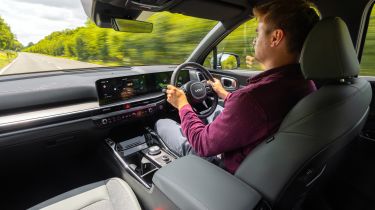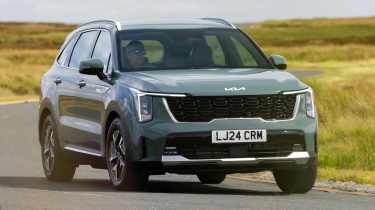Kia Sorento review - Engines, drive & performance
The big Kia has a comfortable, sophisticated feel and a good range of engines
While we already tested a version of the latest Kia Sorento in the United States to get a feel for its new look and interior, it was fitted with a 2.5-litre engine we won’t be getting in the UK. Now we’ve driven the Sorento Hybrid with the 1.6-litre petrol engine and electric motor which is expected to be the biggest seller, along with the 2.2-litre diesel engine.
There are no major changes to the way the Sorento drives compared to before the facelift. Despite the fact that the Sorento is actually lighter than you might expect of a seven-seater SUV, it’s not very punchy to drive, and the six-speed automatic transmission is somewhat to blame for this. Still, the Sorento’s electric motor means it feels capable enough and power delivery is smooth, though we weren’t driving with the car fully laden.
Ride quality is the focus here, so there’s not much for keen drivers to look forward to. Our first test car sat on very small 17-inch alloy wheels, and when we swapped over to one with larger 19-inch wheels there was no detrimental effect on the ride, so it’s worth going for the better-looking larger ones if you want some extra flair.
More reviews
While the Sorento’s steering is well weighted and the large SUV feels stable at speed, there’s a bit of a delay to your inputs when cornering due to its very soft suspension. There’s decent grip and composure on offer, but the Sorento doesn’t respond especially well to quick changes of direction.
The Kia Sorento makes for a great motorway cruiser – wind and road noise are kept to a minimum and refinement is impressive, and although there is some engine noise once the petrol kicks into life, the transfer from electric to petrol is very smooth.
The Kia Sorento gets a 'Terrain Mode' system, allowing the driver to choose settings for driving on snow, mud and sand, should those conditions arise. This isn’t a hardcore off-roader and won’t give a Land Rover Defender a run for its money, but features like this should help you out if you ever find yourself towing a horsebox across a muddy field.
Hybrid engines
The standard hybrid Sorento is fitted with a 1.6-litre turbo petrol engine and an electric motor, giving it a combined total of 212bhp. From a standstill, the extra pulling power provided by the electric motor is instantly noticeable. The Sorento certainly feels quick enough for a big SUV, with the petrol/electric powertrain offering ample power for getting up to speed on motorways; it should be enough to satisfy buyers looking for a diesel alternative. However, the 1.6-litre petrol engine can sound rather strained if you ask for lots of power, especially at the top of its rev range, so it’s better treated with a light foot.
When driving in town, running on electric power is possible if you’re gentle with the accelerator – Kia doesn’t give an exact speed for when the petrol engine kicks in, but we managed to travel up to 33mph on electricity alone. When the petrol engine starts up the transition is refined and quiet, and the six-speed automatic gearbox is well-suited to the hybrid powertrain, with smooth gear changes during normal driving.
Plug-in hybrid engines
The plug-in hybrid Sorento combines the same turbocharged 1.6-litre petrol engine and six-speed automatic gearbox as the standard hybrid and since the facelift it also produces the same power output of 212bhp, whereas this was a more powerful 249bhp before.
In full EV mode, the Sorento PHEV is whisper quiet, with only a hint of tyre noise at higher speeds. Even on the motorway, the petrol engine is barely audible, meaning the car feels very refined on the move. Push the accelerator hard and the electric motor gives it a healthy dose of extra power.
We found the PHEV to handle very similarly to the regular hybrid model, despite the extra weight of the larger battery, with impressive chassis control and decent resistance to body lean in corners. The steering lacks feel but it does have a positive precision and weight to it.
Kia Sorento diesel engine
While the 2.2-litre diesel engine may have been offered in the Sorento for quite some time, it has been thoroughly redeveloped during its life, with an aluminium cylinder block and other new parts that reduce its weight and improve performance. With 191bhp and 440Nm of pulling power, it offers impressive acceleration despite its hefty weight.
The diesel is also paired with four-wheel drive and an eight-speed dual-clutch automatic gearbox that offers very smooth shifts, so long as you keep it in its ‘Standard’ or ‘Smart’ mode – ‘Sport’ tends to hold the car in lower gears for too long. It feels like a good match for the Sorento, and there's almost no diesel clatter when starting the engine or under acceleration.
The hybrids are almost as efficient, however, and in some situations they’re even more economical than the diesel, yet still perfectly adept for longer journeys. As a result, we think they represent the sweet spot, and most low to medium-mileage drivers who aren’t towing should opt for these instead.










